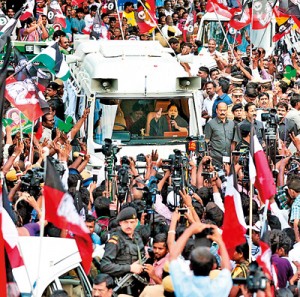Sunday Times 2
It’s freebie season in Tamil Nadu ahead of tomorrow’s polls
It’s election time in the southern Indian state of Tamil Nadu. And for voters, it means just one thing: freebies.
As campaigning for assembly elections intensifies, voters are being showered with promises of gold and smartphones, free laptops and free Wi-Fi.

Jayaram Jayalalithaa, leader of All India Anna Dravida Munnetra Kazhagam (AIADMK), attends a public rally during election campaigning in Chennai on May 11 (AFP)
Tamil Nadu Chief Minister J. Jayalalithaa, 68, who heads the All India Anna Dravida Munnetra Kazhagam (AIADMK), has been particularly generous – so much so that she has come under criticism from political rivals.
Her sweeteners? Free smartphones for the poor, loan waivers for farmers, 100 units of free electricity for households, breakfast for primary school children, free cable TV for those who subscribe to the government cable service Arasu, a 50 per cent subsidy on motorcycles for working women and 8g of gold for poor brides.
Not to be outdone, the rival Dravida Munnetra Kazhagam (DMK) party, led by 92-year-old Mr M. Karunanidhi, is promising mobile phones for the poor at cheaper rates, student loan waivers, free laptops with Internet connection for students and 60,000 rupees (S$1,200) as marriage assistance for women.
“This time, some would argue, the subsidy culture seems to have gone overboard. (Tamil Nadu) is the first state which initiated the culture of freebies four decades ago,” said Dr Sandeep Shastri, pro vice-chancellor of Jain University in Bangalore.
“People have got so used to competitive freebies that when one party announces subsidies, another comes up with even more flattering subsidies.”
Tamil Nadu politics is dominated by the two southern parties, which have alternated in power over the past five decades, with national parties having little influence.
Although there is no evidence of freebies influencing votes, the DMK in 2006 offered television sets to the poor and subsequently went on to win that election.
Five years later, though, the party won just 23 seats while AIADMK won 150 of 234 seats. For next Monday’s elections, the majority of opinion polls have given a clear win to Ms Jayalalithaa. At least one opinion poll by a DMK supporter has given the win to the DMK.
Still, some believe the results could be much closer. Also added to the mix is a third front of smaller parties led by popular actor turned politician “Captain” Vijayakanth.
“It is not going to be an outright clear mandate (as predicted). The DMK is inching forward in urban areas and more particularly in Chennai. As far as semi-urban and semi- rural areas are concerned, AIADMK support is intact. (Ms Jayalalithaa’s) rural-oriented programmes have been successful,” said Madras University political analyst Ramu Manivannan, adding that Ms Jayalalithaa “has always been relying on freebies. All politicians do”.
In 2013, the Supreme Court said freebies “shake the root of free and fair elections to a large degree”, and there have been concerns that the new freebie announcements in Tamil Nadu could further bleed government coffers. According to The Hindu newspaper, Tamil Nadu governments have spent nearly US$2 billion (S$2.7 billion) over the past decade on free colour TV sets, laptops and household appliances.
“If the government continues to spend like this (on freebies), it will become bankrupt at some point.
Normally, people ask: Give us good hospitals, medical facilities, roads. Now, people are protesting if they don’t get freebies. Politicians have turned people into beggars,” said Madras High Court advocate S. Subramaniam Balaji.
As the race heats up, some see the benefits of giving out free goods.
“This is a way of redistribution of wealth when other welfare measures are failing and the state is withdrawing from its duties to give welfare. This is how the electorate is getting something back from the state,” said Professor R. Venkatachalapathy of the Madras Institute of Development Studies.
Courtesy Straits Times, Singapore

